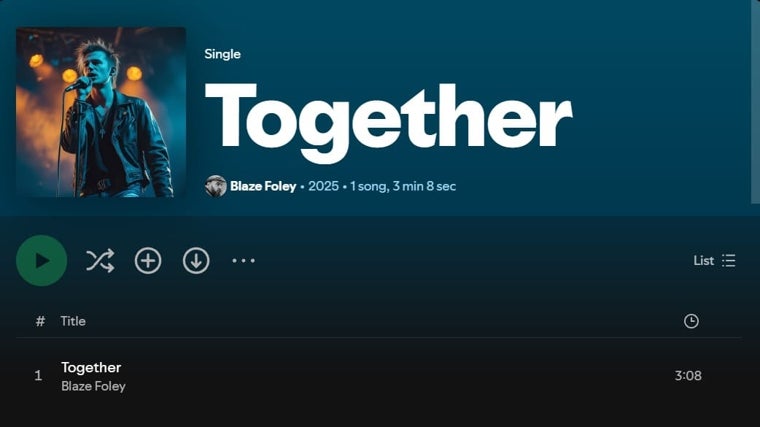Spotify publishes AI-generated songs by dead artists without permission

A new scandal has rocked Spotify. A San Francisco journalist named Emanuel Maiberg has published a report in the independent outlet 404 Media detailing a new ethical practice by the music streaming site. According to this information, which has already been reported by several specialized publications such as New Musical Express, Spotify is allegedly publishing songs by deceased artists generated by artificial intelligence , without the permission of their heirs.
Maiberg discovered it when he visited the official profile of Blaze Foley (a cult country musician known for his song "Clay Pigeons" and whose biopic was directed by Ethan Hawke) and saw that he had released a new single titled "Together." Nothing out of the ordinary, except that Foley has been dead for 36 years.
The journalist contacted Craig McDonald, owner of Lost Art Records, the label that distributes all of Foley's music and manages his Spotify page, who replied: "I can tell you clearly that this song is not Blaze, nor is it close to Blaze's style, at all. It's some kind of AI bot, so to speak. It has nothing to do with the Blaze you know; that whole post has the authenticity of an algorithm."
According to Maiberg's article, McDonald was already aware of the scam because his wife noticed the scam a few days earlier when she logged into Foley's Spotify account. They immediately sought an explanation from Lost Art's distribution partner, Secretly Distribution, but received no response. The story was all the way back to TikTok .
When explaining what was happening to Spotify and asking for an explanation, the platform responded: “We have reported the issue to SoundOn, the distributor of the content in question, and it has been removed for violating our deceptive content policy.” SoundOn is a music distributor owned by TikTok that primarily exists to allow people to upload music directly to TikTok and earn royalties . SoundOn also allows artists to distribute their music to other platforms. “TikTok did not immediately respond to my request for comment, but I will update this story if I hear back,” Maiberg writes.
McDonald asserts that “it’s damaging to Blaze’s reputation that this happened.” “ It’s shocking that Spotify doesn’t have a security solution for this kind of action , and I think the entire responsibility lies with them. They could fix this problem. One of their talented software engineers could stop this fraudulent practice in its tracks, if they had the will to do so. And I think they should take that responsibility and do something quickly. Spotify shouldn’t allow any song to appear on an artist’s official page without the page owner’s approval first.”

The harm to Foley's heirs, according to McDonald, "is that people who don't know Blaze go to the site thinking, maybe this is part of Blaze, when it clearly isn't. So again, I think Spotify could easily change some of its practices. I'm not an engineer, but I think it's pretty easy to prevent this from happening in the future."
At the bottom of the Spotify page for the AI-generated song 'Together,' there's a copyright mark from a company called Syntax Error. Following up on the trail, he found more: "I couldn't find any information about a music distribution company by that name, but searching Spotify, I found the same copyright mark appears on a page for another AI-generated song by Grammy-winning country singer-songwriter Guy Clark, 'Happened To You,' who died in 2016. That song was also uploaded to Spotify last week, and it too features an AI-generated image of a singer who looks nothing like Clark."
There’s a third song that includes the Syntax Error copyright mark, Dan Berk’s “With You,” “which was uploaded at the same time and also features an AI-generated image of a singer who bears no resemblance to him,” Maiberg says. “Berk did not immediately respond to a request for comment, but according to a spokesperson for Reality Defender, a deepfake detection company, all of the tracks have indicators that show a higher-than-normal likelihood of AI generation.”
ABC.es



%3Aformat(jpg)%3Aquality(99)%3Awatermark(f.elconfidencial.com%2Ffile%2Fbae%2Feea%2Ffde%2Fbaeeeafde1b3229287b0c008f7602058.png%2C0%2C275%2C1)%2Ff.elconfidencial.com%2Foriginal%2Ffe4%2Fe22%2F41a%2Ffe4e2241af3e92a070fd2b2ac3c85ffe.jpg&w=3840&q=100)
